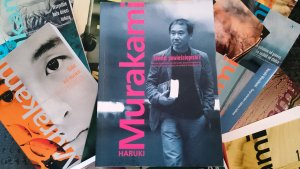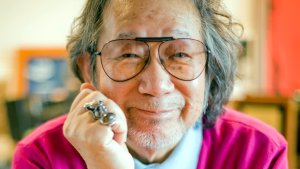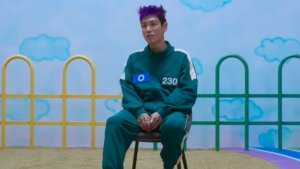 Cat-Loving Haruki Murakami and the Abundance of Movie Adaptations
Cat-Loving Haruki Murakami and the Abundance of Movie Adaptations
My third set of Weekend Recommendations is slightly different from the previous ones because I would like to present my three favourite movies by Ang Lee, which are informally known as the “Father Knows Best” Trilogy. These motion pictures provide a careful examination of family life, always with the figure of a conservative father at the centre (portrayed in all three films by Sihung Lung, a Taiwanese veteran actor brought back out of retirement by Lee). So, without further due, let’s get into discovering the earliest works of Ang Lee:

Pushing Hands
Country: Taiwan
Year: 1991
Synopsis: Mr Chu (Sihung Lung) is a Tai Chi master who arrived from Taiwan to live in the U.S. together with his son Alex (Bo Z. Wang) and his family. While educating his grandson Jeremy (Haan Lee), Mr Chu is unable to communicate with Alex’s wife, Marta (Deb Snyder), who is an aspiring writer and desires peace at home. Mr Chu finds it increasingly difficult to live in the confines of Western culture, but he seeks solace in contact with Mrs Chen (Wang Lai), a cooking instructor at a Chinese Community Centre. The family drama escalates to such a degree that Mr Chu leaves the house to find luck on his own on the streets of New York.
I have seen Pushing Hands for the first time on TV years ago and liked it very much, not knowing that Ang Lee himself was responsible for directing this little gem. Sihung Lung sensitively portrayed a martial artist with a traumatic past who experiences a culture shock upon arriving in America. Even though his son loves him, there is too big a break in culture and lifestyle between Mr Chu and Martha. A few funny scenes ensue because of that; however, the ultimate consequence of Mr Chu’s “Pushing Hands” is his inability to adjust to a new environment.
Although the movie lasts 100 minutes, it touches upon many issues which are essential even today like the generational gap, tradition vs progress or stoicism consumed by the urban hustle and bustle. Mr Chu only wants to lead an independent and meaningful life while being denied a proper place in their new country at the same time. As a result, the only way for him to get things done is by showing a total resistance to the American way of life.
It is highly recommended to anyone who is into films examining cultural differences. If you like a slow but engaging slice of life story, then this movie is very much for you. Pushing Hands is a perfect choice for a quiet family evening.

The Wedding Banquet
Country: Taiwan
Year: 1993
Synopsis: Meet Wai-Tung Gao (Winston Chao). He is a prosperous businessman with American citizenship. His Taiwanese parents, Mr and Mrs Gao (Sihung Lung and Gua Ah-Leh), are fruitlessly urging Wai-Tung to get married. The problem is that Wai-Tung is living together with his friend Simon (Mitchell Lichtenstein) as a gay couple and he is afraid to tell the parents. In the meantime, Wai-Tung’s tenant, Wei-Wei (May Chin), finds herself out of job and in need of a green card. Simon comes up with an idea to accommodate all parties: Wai-Tung will have a sham marriage with Wei-Wei. In this way, she will get to stay in the U.S. and the parents will let Wai-Tung off the hook. What can possibly go wrong?
Based on the outlined synopsis, it becomes noticeable that The Weeding Banquet may have served as a source of influence for Fake Couple (2015) drama (which I recommend as well). However, it does not have the same degree of crazy playfulness as the television series. There are many funny situations in The Wedding Banquet indeed, but they are intermingled with bittersweet moments of family members lying through their teeth in order not to hurt one another.
The Wedding Banquet is not so much a comedy of mistakes than careful observation of family relations. In an almost documentary-like fashion, Ang Lee presents us with the wedding party that is the ultimate culmination of Wai-Tung and Wei-Wei’s fraud as well as Mr and Mrs Gao’s long-time dream. Although this is just fiction, we find ourselves cheering for all the characters to find a proper solution to their problems.
Apparently, the idea for the movie was suggested to Ang Lee by a Taiwanese screenwriter Neil Peng who heard about a similar story happening to his friend. In consequence, the script went through various drafts in Chinese as well as English only to materialise as a motion picture that mixes Mandarin and English in its dialogue track. Ultimately, The Wedding Banquet became a box office success in 1993 (outdoing even Jurassic Park in terms of the ratio of returns).
I safely recommend The Wedding Banquet. It is a very engaging story with bright characters and a meaningful ending. I did not regret a minute of it. The chemistry between the actors is fantastic, and a true show-stealer is Gua Ah-Leh as the mother. Still again, this movie is not about gender politics but a genuine, unpronounced love between family members, which provides a room for merging both Eastern and Western values.

Eat Drink Man Woman
Country: Taiwan
Year: 1994
Synopsis: Mr Chu (Sihung Lung) is a widower and a master Chinese chef living in Taipei together with his three unmarried daughters: Chu Jia-Chien (Chien-lien Wu), an execute working in an airline industry; Chu Jia-Jen (Kuei-Mei Yang), a school teacher who has issues with relationships and seeks consolation in Christianity; and Chu Jia-Ning (Yu-Wen Wang), a college student who accidentally gets involved with her friend’s ex-boyfriend. The family lives through everyday existence while ritually eating every night large portions of elaborate dishes prepared by Chu.
Even though Eat Drink Man Woman refers to the Chinese idiom about human desires and provides precisely what the title says, I would not call it a “food picture”. This is not the film about the celebration of eating like, for example, Juzo Itami’s Tampopo (1985), but rather, it is about the food playing the role of a communicator between distanced family members. In all three films of the trilogy, there are Ang Lee’s autobiographical elements, and the issue of father-child conflict is the most predominant here. Mr Chu by no means is a bad father, but he is very traditional and rigid in his relations; yet, similarly to his daughters, he too has some desires which he wants to fulfil.
In Eat Drink Man Woman, Ang Lee beautifully dissects the fabric of modern-day family in the face of rapid globalisation and fading tradition. The three daughters are all very colourful characters who undergo a certain degree of change as the story moves on. Although they vary in age, the daughters become more independent in life due to men they encounter. Thankfully, it is not all about the liberating power of sex, but a genuine connection which expresses itself as either love or friendship, all that with food placed in the background.
I recommend Eat Drink Man Woman to anyone looking for a peaceful two-hour story set in Taiwan. In my opinion, this is a spiritual companion piece to Edward Yang’s Yi Yi (2000). To think that Ang Lee’s career was launched by a random Taiwanese screenplay contest still boggles my mind. This guy is a marvellous director, and I love his three earliest films the most. He really should come back to Taiwan and make at least one more Asian slice-of-life movie. In the meantime, we should all enjoy the "Father Knows Best" Trilogy for what it is.











